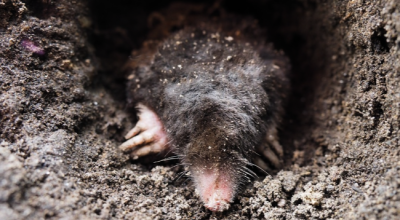Mole Repellents

It is without a doubt that moles can be the biggest pain when it comes to gardening. They tend to dig out a system of tunnels and chambers, and then dispose of the excavated soil by throwing up molehills onto the surface. Moles can also be disruptive to not only the ground, but the roots of your plants. Harming these precious little creatures may be unthinkable, but how can you deter moles and make them go elsewhere?
Electronic Repellents
Moles dislike noise and activity, so placing solar/or battery-powered spikes around your yard may be successful for a time. These spikes emit vibrations that tend to irritate moles and thus drive them away. These spikes are also completely chemical and toxin free, so you will be able to repel moles, without affecting your lawn.
Castor Oil
Other forms of repellents include the use of castor oil to target a mole’s sense of smell to discourage their presence from your lawn. Castor oil is used in mole repelling granules that can be placed on your lawn to help deter and repel moles. Despite their effectiveness, granules will have to be regularly applied in order to achieve long term effectiveness.
Natural Repellents
However, if you do not want to use any chemicals or electronics to deter moles, you can opt for more natural ways to repel moles. These include planting plants like daffodils, marigolds, fritillaries, caper spurge, and castor beans.
Daffodils: Daffodil bulbs are toxic; therefore, moles are likely to avoid their roots.
Marigolds: Marigolds are aromatic and contain natural chemicals, that are likely to repel the soil insects that moles feed upon, making your soil less appealing to moles.
Fritillaries: The fritillaries plant is a member of the lily family and its large waxy bulbs have a strong fox-like scent which appears to repel moles.
Caper Spurge and Castor Beans: The caper spurge is commonly known as “mole plant” due to its apparent ability to repel moles as the scent exuded by the roots into the soil is said to be disliked by moles. Despite their effectiveness, mole plant and castor bean plant (which contains castor oil, a well-known mole deterrent) are considered poisonous and should be avoided around pets and children.
Overall, all of these are effective ways to deter moles. However, some moles are not bothered by vibrations or strong scents, meaning you will have to experiment with different methods in order to find the one which is most effective for you.
